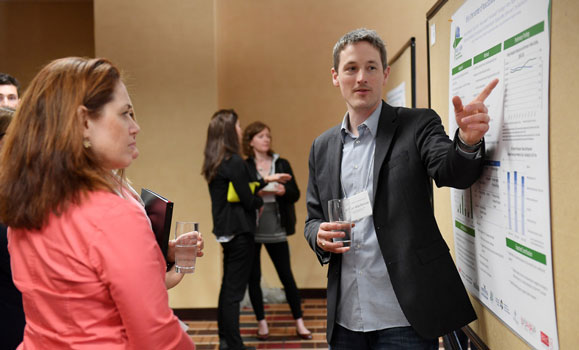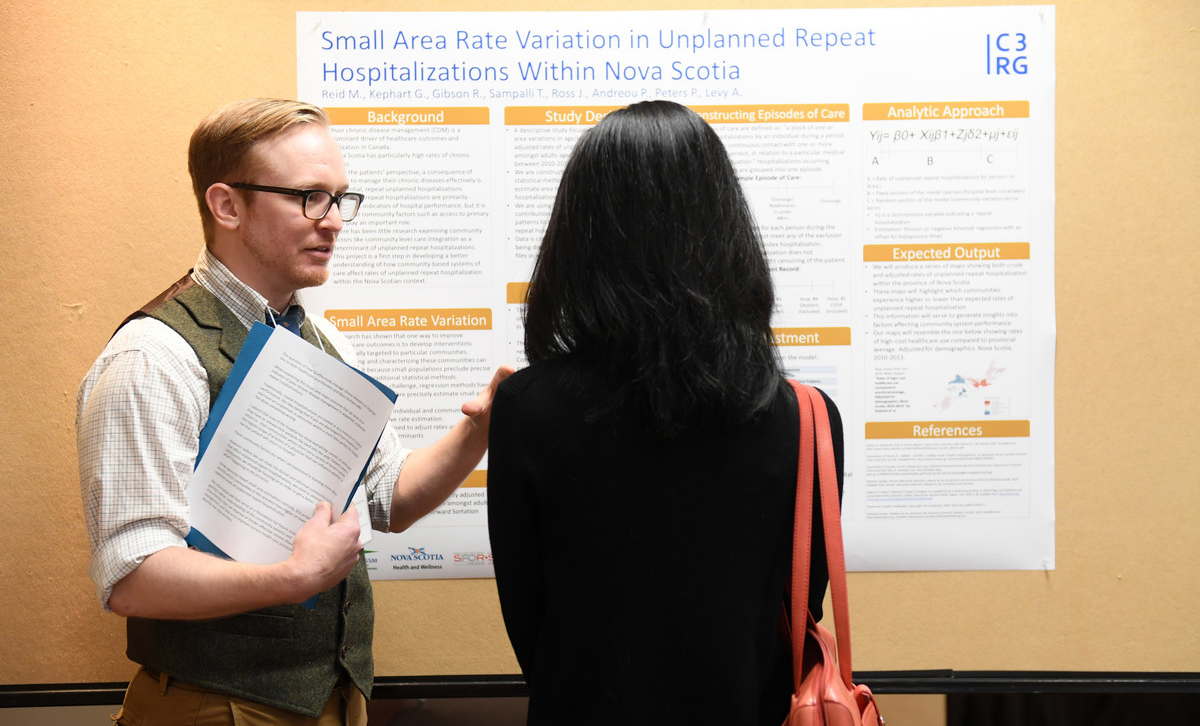News
» Go to news mainA day of collaborative focus means better research and health outcomes for Nova Scotians

Packing a downtown Halifax conference room on a warm spring day, a diverse group gathered for Primary Health Care Research Day (PHCRD). In this brief, but dynamic session participants discussed some of the most complex issues facing the Nova Scotia health care system. Stakeholders included human health researchers, clinicians, patient advisors, and policy-makers from two levels of government. The annual event draws people not only from Nova Scotia but from other Atlantic provinces as well. Part of PHCRD’s appeal is that some of these stakeholders might not normally have the chance to meet, network, and tackle these issues together.
The day was hosted by Collaborative Research in Primary Health Care (CoR-PHC) and co-led by Fred Burge, a professor and research director in the Dalhousie Department of Family Medicine, and Ruth Martin-Misener a professor at the Dal School of Nursing.
“The day is focused on the role that research has in improving primary health care service and delivery. We see this as the gathering place for groups to focus how we are doing on primary health care and how we might do it better,” says Dr. Burge.
A day dedicated to primary health care research
The journey started five years ago when Drs. Burge and Martin-Misener were funded by Dal’s Strategic Research Initiative Fund to put together an inter-disciplinary research team focused on primary health care.
"The team had and still has broad representation from nursing, medicine, pharmacy, dentistry, occupational therapy, social work and Nova Scotia Health Authority among others," says Dr. Martin-Misener.
As part of its inaugural activities, the group decided to hold a primary health care research day on campus. Now in its fourth year, the event has evolved to include research poster competitions and other, interactive activities including panel presentations, opportunities for discussion with local policy makers and clinicians and combinations of those groups.
“The spectrum is constantly expanding in terms of how local policy makers, researchers, students, clinicians, patients and researchers can participate in the conference,” says Dr. Martin-Misener. As a PHCRD first, some of the day's program were offered via webinar to make it easier for stakeholders, who can't attend, to still participate in the event and connect.
One of the major conference themes was how the primary health care community can organize care and resources to tackle health issues currently facing Nova Scotians. Attendees also discussed how primary health care could prevent chronic conditions, and support individuals living with multiple chronic conditions like diabetes, heart disease, high blood pressure, and COPD. Another major theme throughout the conference’s presentations and discussions was ensuring both the access to and care for segments of the populations who might have special vulnerabilities or needs.
“The questions these stakeholders are trying to answer are so complex that they require benefit from having the different lenses, knowledge base, theoretical methods, and research methods, not found in one discipline but across disciplines,” says Dr. Martin-Misener.

Working collaboratively to improve quality
The keynote speaker this year was McGill University primary health care researcher and family medicine professor, Jeannie Haggerty. In her keynote address 'What has a health services researcher learned about quality improvement?' Dr. Haggerty discussed creating successful research, and how health services researchers could draw on skill sets from outside the realm of traditional health research such as project management, governance, and implementation science.
“Dr. Haggerty is internationally renown for her experience in working with primary care practices to develop research and quality improvement, using patient-centered measures, those kinds of initiatives within their practices,” says Dr. Martin-Misener. “This is something we want to move towards in Nova Scotia.”
“Dr. Haggerty’s keynote address, with its focus on interdisciplinary research and using skills usually found outside traditional research helped bridge the different stakeholders and made us all feel included,” says Dr. Burge. “This highly integrated working among researchers, clinicians, patients and decision/policy makers is pretty unique and a great strength of CoR-PHC.”
In keeping with its collaborative nature, the event is also open to researchers at all stages of their careers. Undergrad, Master's and PhD students participated in the conference.
"Students are invited to give presentations on their (research) work which is a terrific opportunity for us," says Dal Nursing PhD student Britney Benoit. "Seeing other presentations, makes you consider research topics you might not normally have exposure to if it wasn't for PHCRD. It really highlights the diversity of local research."
During one of the afternoon oral presentation sessions, Ms. Benoit spoke about her research on breastfeeding as standard of care for procedural pain management in infants.
Joelle Monaghan, a recent graduate of the Dal Master of Nursing program, and research trainee, saw value in connecting with other stakeholders. "It's a great opportunity to network with clinicians and other researchers who can be undergrad students or PhDs", says Monaghan. Joelle presented her research work on understanding how new mothers access information through online and offline social networks.
“PHCRD is developing and nurturing the primary health care research community in Nova Scotia,” says Dr. Martin-Misener. “There is a lot of phenomenal research being done and it (PHCRD) provides a forum to share research findings. Being able to share those findings and see benefits to practice or policy is a great outcome of the day.”
Drs. Burge and Martin-Misener share the excitement of the increasing involvement of patients as part of research teams. As a result, for next year’s event they aim to have patients play an even more prominent role in PHCRD.
It might just be a day but PHCRD is evidence of the positive power of interprofessional collaboration. It is an opportunity for primary health care stakeholders to network, learn about each other’s work, and build partnerships so that more research can be conducted – research that will be of benefit to Nova Scotians and all Atlantic Canadians.
Recent News
- Bridging continents: Dal students to learn, share and connect in West Africa
- Partnership between UpLift and Public Health sees continued funding allocated for Youth Engagement Coordinators
- Dal Health grad students use podcasting to discover the people behind the science
- Nursing student closer to living out her dream of helping people thanks to support of new award
- Master of Nursing grad passionate about working in mental health and addictions
- MSc Audiology grad shifts career from entomologist to audiologist
- Occupational Science grad exploring concept of care farming
- Dal Crossroads continues 20 year legacy of student ‑led learning
